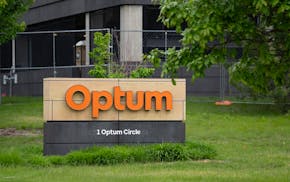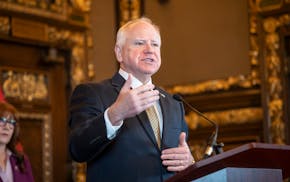Minnesota is now eligible to compete for millions in federal dollars after being designated a tech hub by the U.S. Department of Commerce.
President Joe Biden announced 31 hubs on Monday.
"The U.S. will lead the world again in innovation across the board," Biden said at a White House event Monday announcing the decision.
The new program aims to spread the benefits of tech sector growth beyond traditional hubs from California's Silicon Valley to Boston, said Commerce Secretary Gina Raimondo.
"Those tech ecosystems are concentrated in just a few places around the country," she told reporters. "They don't reflect the full potential of our country. ... They don't corner the market on great ideas."
Sen. Amy Klobuchar, along with business and civic leaders, said Minnesota MedTech 3.0 is one of them.
MedTech 3.0, like the other 30 hubs, will receive about $400,000 to $500,000 to help put together a plan to compete for the bigger grants. Five to 10 of the hubs will be awarded $40 million to $70 million.
"No one company can do this alone. At Medtronic we're very committed to this," said Geoff Martha, CEO of Medtronic, at the news conference with Klobuchar.
MedTech 3.0 — spearheaded by Greater MSP — calls for bringing together Minnesota hospitals, research institutions and medical device manufacturers to integrate artificial intelligence, data science and device manufacturing with the goal of making the state a global center for "smart med-tech."
"The next frontier of med-tech is more connected," said Peter Frosch, CEO of Greater MSP, during the news conference. "It's going to spur a new generation of startups."
Klobuchar noted the extensive list of groups that had worked to pitch Minnesota MedTech 3.0.
"Mayo is also part of this," Klobuchar said. "Medtronic played a major role in this," she said.
Medtronic, which has its operational headquarters in Fridley, is the world's largest medical device company. Minnesota has a thriving med-tech business climate and is home to numerous medical and health care startups.
Martha pointed to the roots of Medtronic, which introduced the first battery-operated pacemaker in 1957, as the foundation of the state's med-tech industry and its global influence.
"This ecosystem was the beginning of medical technology as we know it," Martha said.
The federal program to create regional tech hubs is being driven by an effort to strengthen U.S. global competitiveness. There were a total of 198 regional applications competing for tech hub designation.
"Our state has so much untapped potential," said Ping Yeh, CEO of Arden Hills-based VOCxi Health.
The Wisconsin Biohealth Tech Hub was another tech hub designee.
In the past few weeks, Minnesota-centric projects have scored big grants from federal infrastructure and energy funds.
Minnesota, North Dakota and South Dakota have been chosen to host one of seven U.S. "clean" hydrogen production hubs, scoring up to $925 million in federal money. Minneapolis-based Xcel Energy is a primary partner in the Upper Midwest venture — dubbed the Heartland Hydrogen Hub — which would use renewable power and nuclear energy to produce hydrogen in Minnesota. These regional hubs mark one of the largest federal energy programs ever, with a total investment of $7 billion.
Last week, a consortium led by the Minnesota Department of Commerce won $464 million for five transmission projects across seven Midwestern states, with Xcel Energy a big player. Xcel also won money for wildfire prevention.
In total, Minnesota-centric projects will share $614 million of the $3.5 billion in federal infrastructure planning announced last week to strengthen electric grid resilience and connect them to renewable energy wind and solar plants.
This story includes reporting by Reuters.

Delta hiked fares for solo travelers, until Twin Cities travel experts caught the change

In first speech back, UnitedHealth's new CEO pledges to review hot-button issues

A child had measles at Mall of America, concerning state health officials who don't know source

Ramstad: Gov. Walz, things are not getting done in Minnesota

